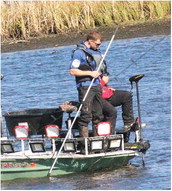Marathon changes its bulk water fee again
In response to complaints, Marathon City has switched back to a quarterly fee for bulk water users, but it will be slightly higher than what it was before.
At its monthly meeting on April 26, the commission voted to charge $50 per quarter for those who acquire bulk loads of water from the village’s treatment plant or hydrants. Before that, the village had been charging users $30 every time they filled up a tank, plus $5.10 per thousand gallons of water. This meant that those with smaller-capacity tanks ended up paying more for the same amount of water because they had to make more trips.
The $30 charge was previously assessed on a quarterly basis, but based on the advice of the village’s auditor, the commission voted to make it a per-load fee starting at the beginning of this year. After the change went into effect, commissioners started to get complaints from local farmers with smaller water tanks who need to make frequent stops at the village for water.
Village administrator Andy Kurtz consulted the Wisconsin Public Service Commission, which sets water rates for utilities throughout the state. The PSC said the village could charge its access fee based on whatever frequency it wanted, and it could also set the amount.
Commissioners reviewed usage data for all of the village’s bulk water customers, which showed one of them being charged as much as $1,700 for filling up 57 times, plus another $7,500 for the water itself. They also looked at charges from four surrounding communities, which either charge a $25 daily fee, a $35 per-fill fee or a one-time hook-up fee.
Kurtz said the purpose of the access fee is to cover the cost of administering the water utility and handling billing. At $50 per quarter, he believes the village can cover these expenses, but the village will continue to track revenues to make sure they are adequate.
The village will continue to also charge $5.10 per thousand gallons of water, a rate set by the PSC, Kurtz said.
“We do have to get compensated for the cost of the water,” he said.
However, since the village has discretion over how often it charges customers for filling up, Kurtz said commissioners decided to switch back to a quarterly fee, with a $20 increase to more equally spread out the expenses.
“They thought that was a little more fair to the local ag users,” he said.
Other business
The commission awarded a $374,914 contract to Earth Inc., which submitted the lowest bid on a Third Street project scheduled for this year. The project will involve replacing water mains, installing new hydrants, putting in curb and gutter and paving from Main Street to Pine Street. The company plans to start working right away.
The commission approved a $27,457 payment to Miltrim Farms of Athens as part of the village’s multidischarge variance, which allows its wastewater plant to exceed the DNR’s phosphorus discharge limit. The village purchases credits at a rate of $60 per pound, with Miltrim using that money to prevent phosphorus from entering local waterways. In 2022, the village fell 458 pounds short of its load limit.
The commission approved a $443,178 payment to Market & Johnson and $41,800 to Strand Associates for work done on the new wastewater treatment plant. The commission also requested $484,978 in reimbursement from the Clean Water Loan Fund.
Kurtz told commissioners that work is progressing on the new sewer plant, but there have been some delays due to electrical components being on back-order. Several change orders have been approved, including one for additional conduits on air hoses, estimated to be about $24,000. Another one, $2,400 for a new transformer, was rejected because a subcontractor overloaded a circuit, blowing out the transformer.
Utility superintendent Ken Bloom reported an overflow at the wastewater plant on April 1 due to excessive rains and snowmelt, resulting in an inflow of three times the plant’s wet weather design. The DNR was notified, and a notice was posted to the village’s website.


